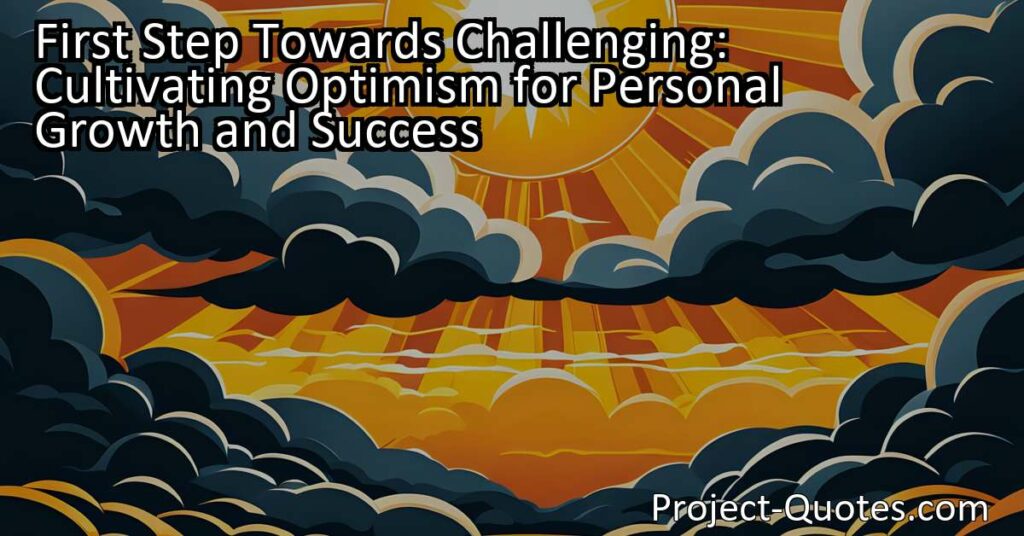Pessimism leads to weakness, optimism to power.
William James
First Step Towards Challenging: Cultivating Optimism for Personal Growth and Success Discover the power of optimism as the first step towards taking on challenges and achieving personal growth and success. Learn how shifting your mindset from pessimism to optimism can lead to increased motivation, resilience, and the ability to overcome obstacles. Cultivate optimism through gratitude, positive self-talk, embracing failure as a learning opportunity, and surrounding yourself with positivity.
Table of Contents
Meaning of Quote – Pessimism leads to weakness, optimism to power.
Have you ever heard the saying, “Is the glass half empty or half full?” It’s a simple question that can have profound implications on how we view the world and shape our own destiny. William James, a renowned American philosopher and psychologist, once said, “Pessimism leads to weakness, optimism to power.” This quote encapsulates the idea that our mindset plays a crucial role in determining our strength and abilities.
Let’s start by exploring what pessimism and optimism truly mean. Pessimism is a mindset characterized by negativity, doubt, and a tendency to focus on the worst possible outcomes. It’s like wearing a pair of dark glasses that only allows you to see the gloomy aspects of life. On the other hand, optimism is a mindset characterized by positivity, hope, and a belief in favorable outcomes. It’s like wearing a pair of rose-colored glasses that allows you to see the bright side of every situation.
Now, why would James claim that pessimism leads to weakness while optimism leads to power? At first glance, it may seem like a bold statement, but let’s dig a little deeper. When we approach life with a pessimistic mindset, we tend to expect the worst. We are constantly on guard, fearing failure and disappointment. This mindset can weigh us down, sapping us of energy and motivation. It becomes a self-fulfilling prophecy, as our negative beliefs limit our actions and prevent us from reaching our full potential.
Imagine a student who believes they will fail a test before even taking it. Their pessimistic mindset causes them to doubt their abilities, leading to anxiety and a lack of preparation. As a result, their performance suffers, confirming their initial belief. Conversely, an optimistically-minded student sees the test as an opportunity to showcase their knowledge. They approach it with confidence, study diligently, and perform to the best of their abilities. Even if the outcome is not perfect, their positive mindset allows them to learn from the experience and grow stronger.
It’s important to note that optimism does not mean denying reality or suppressing negative emotions. Optimism is about acknowledging challenges and setbacks while maintaining a positive outlook on the future. It’s about finding opportunities for growth and learning from every experience, no matter how difficult. Optimism brings hope, resilience, and a willingness to take risks, all of which contribute to personal growth and success.
One might wonder, is optimism simply an innate trait, or can it be cultivated? The good news is that optimism can indeed be learned and nurtured over time. It involves shifting our perspective, challenging negative beliefs, and developing a resilient mindset. Here are a few strategies that can help cultivate optimism and harness its power:
1. Practice gratitude: Take time each day to appreciate the positive aspects of your life. Reflect on what you are grateful for, whether it’s the support of loved ones, good health, or small moments of joy. This practice helps shift your focus from what’s going wrong to what’s going right.
2. Surround yourself with positivity: Surrounding yourself with positive influences can have a tremendous impact on your mindset. Seek out supportive friends and mentors who inspire and uplift you. Read motivational books, listen to uplifting podcasts, or engage in activities that bring you joy.
3. Challenge negative thoughts: Becoming aware of your negative thoughts is the first step towards challenging them. When you catch yourself thinking negatively, try reframing the situation in a more positive light. Replace self-criticism with self-compassion and remind yourself of your strengths and past successes.
4. Set realistic goals: Optimism is not about setting unrealistic expectations; it’s about setting achievable goals that inspire and motivate you. Break larger goals into smaller, manageable steps, and celebrate your progress along the way. This approach helps build confidence and fuels optimism.
5. Embrace failure as a learning opportunity: Failure is a natural part of life and should not be viewed as a reflection of personal worth. Instead of dwelling on setbacks, see them as valuable learning experiences. Analyze what went wrong, adjust your approach, and keep moving forward.
6. Practice positive self-talk: Be mindful of the way you talk to yourself. Use language that is encouraging, kind, and supportive. Replace negative self-talk with positive affirmations that reinforce your abilities and potential.
7. Cultivate resilience: Optimism and resilience go hand in hand. Resilience is the ability to bounce back from adversity and face challenges head-on. Develop a “never give up” attitude, embrace change, and remind yourself that setbacks are temporary and can be overcome.
By incorporating these strategies into your life, you can gradually shift towards a more optimistic mindset. As your optimism grows, so does your inner strength and power. Optimism opens doors to new opportunities, fuels perseverance, and enhances overall well-being.
In conclusion, William James was onto something significant when he stated, “Pessimism leads to weakness, optimism to power.” Our mindset has a profound impact on our strength, abilities, and capacity for success. Choosing optimism allows us to tap into our full potential, embrace challenges, and live a more fulfilling life. So, the next time you find yourself facing a difficult situation, ask yourself, “Is the glass half empty or half full?” and remember the power of optimism.
I hope this quote inspired image brings you hope and peace. Share it with someone who needs it today!


